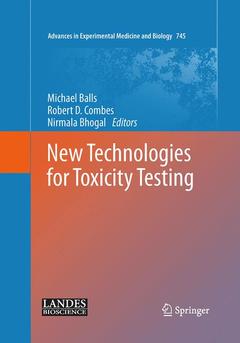New Technologies for Toxicity Testing, 2012 Advances in Experimental Medicine and Biology Series, Vol. 745
Coordonnateurs : Balls Michael, Combes Robert D., Bhogal Nirmala

Current Developments in Cell Culture Technology.- Embryonic Stem Cells in Safety Pharmacology and Toxicology.- Trends in Cell Culture Technology.- Tissue Engineering in the Development of Replacement Technologies.- Toxicity Testing of Nanomaterials.- Physiologically‑Based Pharmacokinetic (PBPK) Models in Toxicity Testing and Risk Assessment.- In Silico Methods for Toxicity Prediction.- Luminescent Quantum Dots for Molecular Toxicology.- Engineering Quasi‑Vivo® In‑Vitro Organ Models.- ECVAM and New Technologies for Toxicity Testing.- Medium to High Throughput Screening: Microfabricat ion and Chip‑Based Technology.- The Use of Genomics in Model In Vitro Systems.- The Use of Integrated and Intelligent Testing Strategies in the Prediction of Toxic Hazard and in Risk Assessment.
MICHAEL BALLS read Zoology at Oxford University, and, after postgraduate studies in Switzerland and postdoctoral research in the USA, returned to Britain in 1966, to become a Lecturer in the School of Biological Sciences at the University of East Anglia. In 1975, he moved to the University of Nottingham Medical School, as a Senior Lecturer, and was later promoted to Reader in Medical Cell Biology and then to Professor of Medical Cell Biology. He is now an Emeritus Professor of the University. Professor Balls became a Trustee of FRAME (Fund for the Replacement of Animals in Medical Experiments) in 1979, and has been Chairman of the Trustees since 1981. He has been Editor of ATLA (Alternatives to Laboratory Animals) since 1983. He acted as an adviser to the British Government during the drafting and passage through Parliament of the Animals (Scientific Procedures) Act 1986, and, from 1987-1995, was a founder member of the Animal Procedures Committee, which advises the Government on all matters related to animal experimentation. In 1993, Professor Balls became the first Head of the European Centre for the Validation of Alternative Methods (ECVAM), which is part of the Institute for Health & Consumer Protection of the European Commission’s Joint Research Centre, located in Ispra, Italy. ECVAM is responsible for leading and coordinating efforts at the European Union level, which are aimed at reducing, refining and replacing the use of laboratory animal procedures in research, education and testing, through the development and validation of advanced testing methods. He retired from ECVAM at the end of June 2002, but continues to devote much of his time to FRAME.
ROBERT D. COMBES is an independent consultant in toxicology. He has held positions inacademia and industry, where he broadened his interests to cover in vitro toxicology, biotransformation, in silico prediction, and the Three Rs (reduction, refinement and replacement) as applied to laboratory animal
Date de parution : 08-2016
Ouvrage de 258 p.
17.8x25.4 cm
Date de parution : 02-2012
Ouvrage de 258 p.
17.8x25.4 cm
Thème de New Technologies for Toxicity Testing :
Mots-clés :
Balls; New technology; Testing technology; Toxicity technology; Toxicity testing



